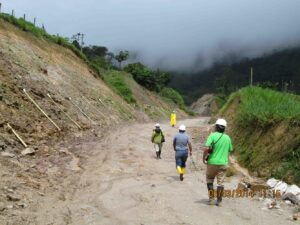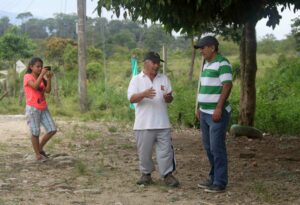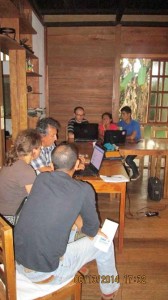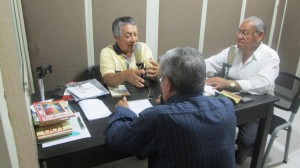Engaged Anthropology Grant: Simón Uribe

Simón Uribe is Lecturer in the Department of History at the Universidad de los Andes in Bogotá. In 2009, while a Ph.D. student in Geology at the London School of Economics, Uribe received a Dissertation Fieldwork Grant to aid research on ‘The State at the Frontier: A Historical Ethnography of a Road in the Putumayo Region of Colombia,’ supervised by Dr. Sharad Chari. In 2014, he was awarded the Engaged Anthropology Grant to return to his fieldsite and share his research with the community that hosted him.
During 2010 I conducted fieldwork in the Colombian Putumayo, a border province in the southwest part of the country traditionally portrayed as a marginal territory marked by conflict, lawlessness and violence. My research focused on the history and ethnography of a road connecting the Andean and Amazon regions, and sought to explore the processes and practices of state-building in this particular province. The history of this road dates back to the mid nineteenth century and goes up to the present, during which time it has undergone various transformations, from an indigenous trail to a colonisation road and, more recently, to a road project part of a large interoceanic scheme aimed at connecting the Atlantic and Pacific through Brazil and Colombia.

The idea of applying for the Wenner-Gren Engagement Grant originated from a central concern of my research, related to the conflicts around the current road project. The passage of the road through the Amazon-Andes Piedmont, home to indigenous and peasant communities and one of the regions of greatest biodiversity in the world, has been a point of contention on environmental and social grounds. However, the public debate about the road’s actual and potential impacts and conflicts has largely neglected the broader historical and political dynamics in which such conflicts and impacts are grounded. The Engagement project, conceived in conjunction with the veeduría ciudadana (citizen oversight organization) of the road project, sought to address this problem in two related ways: first, by generating awareness among the local community about the importance of understanding such dynamics in order to face the multiple social, economic and environmental challenges associated to the road; and second, to collectively develop strategies aimed at translating this awareness into effective actions.

Taking into consideration the veeduría’s current main challenges and problems, the project focused on the development of citizen journalism as a way to strengthen the organization, as well as to encourage wider involvement of the broader community as veedores (overseers) of the road. The first strategy or component of the project was to provide basic training in media skills to both members of the veeduría and other people interested in joining the organization, especially among the veredas (rural communities) directly affected by the road. This training, carried out with basic equipment provided by the project (digital cameras and voice recorders), was developed through a series of workshops over a period of six weeks. These workshops covered different topics such as journalism ethics and local history, as well as a wide range of skills, from photo and video reporting to editing and uploading. As the guiding principle of the workshops was to learn by doing, they consisted largely of field activities and exercises like visits to the road project area; interviews with project’s functionaries, road workers, and the local community; and reportage of conflicts and events associated to the project.
Drone video of the construction of the road elaborated by members of the veeduría
More importantly, and apart from those activities, the workshops provided a space for dialogue and discussion, where participants exchanged ideas ant thoughts about the road project and the subject of participation and involvement in the veeduría. The latter has always been a difficult and sometimes controversial issue, especially since mega-projects of this sort are usually an important source of jobs –though temporal and mostly unqualified- for locals, a situation severing community ties and hindering people’s capacity to organize and act collectively. At the same time, however, the rapid changes brought to the area by the project as daily evidenced by the increasing presence and traffic of heavy machinery and workers, has triggered anxieties and concerns among those living in the vicinity of the future road. In this context, the workshops offered a valuable opportunity to reflect not only about the project’s current impacts and conflicts but the meaning and long-term implications of the road.

The main outcome of the workshops was a blog site of the veeduría. This blog was collectively constructed and conceived as a virtual space for the veedores to report, denounce, and inform the broader public about the different problems and issues surrounding the road project. The blog will support the second strategy of the project, which consisted of the development of a radio program for the veeduría. This strategy was regarded by the veedores as crucial for their mission, especially since radio is a widely used source of information and public debate in the region. As some of the members of the veeduría have experience in radio, the project’s contribution was to provide funds to buy radio air time in one of Mocoa’s (Putumayo’s capital) radio stations. The program, of half an hour duration, is currently being broadcasted daily by Radio Waira, Putumayo’s indigenous organization radio station. Both the radio program and the blog will contribute significantly to the veeduría by making visible their role and activities in the road project. Finally, and at a broader level, they will help generate awareness on the importance of civil society engagement in public policy processes, and of the relevance of communication and media technologies as effective tools of social action.